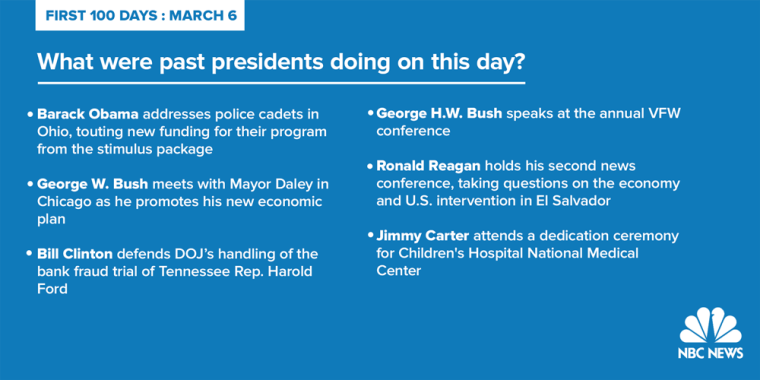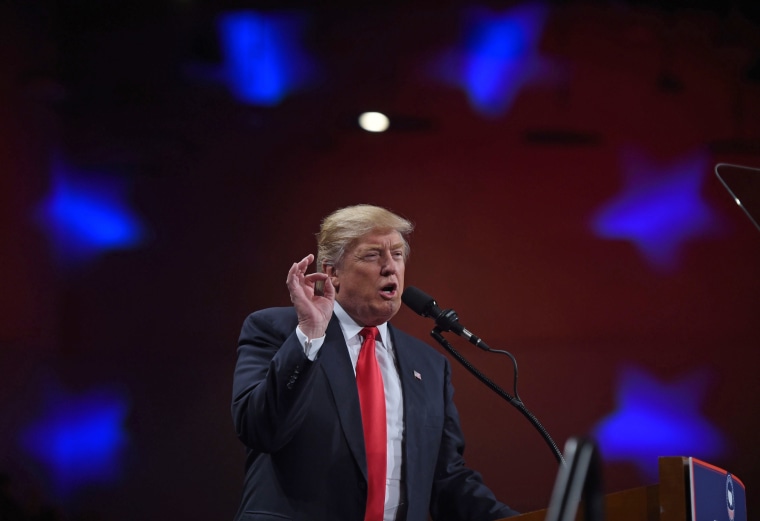First Read is a morning briefing from Meet the Press and the NBC Political Unit on the day's most important political stories and why they matter
Welcome to our post-truth presidency
President Trump’s assertion — without evidence — that Barack Obama wire-tapped Trump Tower during the 2016 election started as a “conspiratorial rant” on conservative talk radio, got picked up by Breitbart News, and then moved over to the president’s Twitter feed, the New York Times writes. FBI Director James Comey has asked the Justice Department to publicly reject Trump’s claim because it’s untrue. And the entire episode potentially opens up President Trump to libel charges. "He's basically stating that Mr. Obama committed crimes, and to state that somebody has committed a crime when it's false is clearly defamatory," Benjamin Zipursky, who teaches defamation law at Fordham University Law School in New York, told NBC News. Welcome to our post-truth presidency. To recap some of Trump’s biggest whoppers since taking office:
- He misstated the size of his inauguration crowd. "It looked like a million and a half people."
- He claimed he had never criticized the CIA or intelligence community. “[The media] “sort of made it sound like I had a feud with the intelligence community."
- He alleged, without evidence, that some 3-5 million people voted illegally in 2016.
- He said his 2016 victory “was the biggest electoral college win since Ronald Reagan” (when Bush 41, Bill Clinton and Barack Obama all had a bigger margin than Trump did).
- And he said, in his presidential address to Congress, that “94 million Americans are out of the labor force” (when that figure includes seniors and teenagers).
Additionally, if you go back before Trump’s presidency, there’s his “birther” claims against Obama; his suggestion that vaccines contribute to autism; his accusation that Ted Cruz’s father was involved in JFK’s assassination; and his declaration that he had always opposed the Iraq war. Make no mistake, all presidents spin/dissemble/lie. But what’s extraordinary about Trump is the frequency, the sloppiness, and the ease with which to spot the false or unsubstantiated claim.
And why that’s a big, big problem
This all raises a question: What happens when a president cries wolf so many times? Can anyone believe him — even on matters like wars, national tragedies, and natural disasters? As NBC’s Benjy Sarlin wrote over the weekend, Trump alleged what would be an historic scandal about Obama, and barely anyone reacted with urgency. What, Sarlin asked, does that say about the White House? About his capacity to relay accurate information to the public? And his propensity to believe conspiracy theories?
On “Today” this morning, White House Deputy Press Secretary Sarah Huckabee Sanders said this about Trump’s wire-tapping charges against Obama: “I think the president firmly believes it did [happen].” And isn’t that the biggest problem of all, especially when no one can produce any evidence?
Clapper: There was no wiretap at Trump Tower
NBC's Kailani Koenig: "Former Director of National Intelligence James Clapper on Sunday denied any suggestion that Trump Tower communications were wiretapped before the election. For the part of the national security apparatus that he oversaw, 'there was no such wiretap activity mounted against the president, the president-elect at the time, or as a candidate, or against his campaign,' Clapper told Chuck Todd in an exclusive interview on Sunday's 'Meet The Press.’”
More: "When Todd asked him whether he could confirm or deny if a FISA (Foreign Intelligence Surveillance Court Act) order for this existed, Clapper declared, 'I can deny it.' Asked again whether there was a FISA Court order to monitor Trump Tower, Clapper said, 'Not to my knowledge.'" And there was this in the interview: "Clapper was also asked on 'Meet the Press' if he had any evidence that the Trump campaign was colluding with the Russian government while the Kremlin was working to influence the election. 'Not to my knowledge,' Clapper said, based on the information he had before his time in the position ended."
Trump read staff “the riot act” last Friday
NBC's Peter Alexander and Hallie Jackson have confirmed new details about the heated discussion inside the Oval Office Friday where President Trump furiously blasted senior staff over the decision that Attorney General Jeff Sessions recuse himself from any involvement in an investigation into Russian meddling in the 2016 election. One aide briefed on events says the president “read them the riot act.” The president, per another aide, feels “very loyal” to Sessions and believes he didn’t need to recuse himself, an action that went against the president’s own statement of support on Thursday in Newport News, VA. One source says the president was directing much of his anger at Chief of Staff Reince Priebus.
What’s motivating all of this? The president, both aides say, is most concerned about the leaks that he believes are coming from inside the U.S. intelligence community.
Administration to unveil revised travel ban (but Trump won’t be there in person)
Per NBC’s Jackson, Trump’s revised travel ban will take place at the Department of Homeland Security and others (but not the president himself), a senior administration official confirms. More from Jackson and Daniel Arkin: “The new executive order removes Iraq from the list of predominantly-Muslim countries whose citizens will face a 90-day ban on travel to the United States, a senior administration official confirmed to NBC News. (The Pentagon and the State Department had reportedly pressed the White House to keep Iraq, an important ally in the battle against ISIS, off the list.) But the revised order keeps the temporary ban on citizens of Iran, Somalia, Sudan, Yemen, Syria and Libya.
The revised order would temporarily halt all refugee admissions to the U.S., a senior administration official familiar with the order told the New York Times, and remove extra restrictions on Syrian refugees. Syrian refugees will now be treated like refugees from other countries and be subjected to a 120-day suspension of the refugee program.” Here’s a timeline of how the controversial order has evolved.
With House GOP set to unveil health-care bill, a reminder that there are few GOP lawmakers with experience in crafting large pieces of complex legislation
NBC’s Alex Moe reports that House Republicans will introduce this week their much-awaited bill to repeal and replace the Affordable Care Act, or “Obamacare.” One of their biggest challenges? “[T]here aren’t many Republicans around with muscle memory of what it’s like to craft large pieces of legislation that rely almost entirely on votes from their side of the aisle. The problem is particularly acute in the House, where just 60 Republicans — a quarter of their caucus — have ever served in the majority with a GOP president,” the Washington Post’s Paul Kane writes. “Moreover, more than 160 House Republicans are getting their first taste of working with a Republican president. Their entire legislative careers until now have been dedicated to stopping an administration’s actions.”
What were other presidents doing on March 6?




